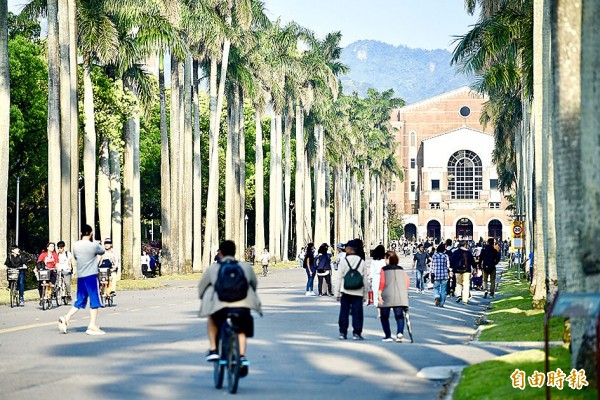《TAIPEI TIMES》 Ministry implementing ‘open university’ concept

The library and the Royal Palm Boulevard on the campus of National Taiwan University are pictured on March 24 in Taipei. Photo: Peter Lo, Taipei Times
MORE OPPORTUNITIES: Deputy Minister of Education Yao Leeh-ter said the new programs would give people the chance to become ‘slashers’ in a ‘gig economy’
By Rachel Lin and Sherry Hsiao / Staff reporter, with staff writer
The Ministry of Education yesterday announced that it is to make obtaining a bachelor’s degree more flexible by giving students up to 10 years to complete their course of studies.
The announcement comes as colleges and universities face the threat of closure due to the nation’s low birthrate and a decreasing school-age population.
People without a college degree or those who wish to earn a second degree would no longer have to complete graduation requirements within four years or be limited by a minimum credits per semester requirement, the ministry said.
The ministry has adopted an “open university” concept in response to students wanting to develop a second skill and wishing to undertake interdisciplinary learning, Deputy Minister of Education Yao Leeh-ter (姚立德) said.
The ministry has designed two programs — one for schools that target students without a bachelor’s degree and one for those wishing to obtain a second bachelor’s degree, he said.
The first program would allow those who are currently employed to accumulate credits without having to complete the requirements for a bachelor’s degree within four years or obtain a minimum number of credits per semester, Department of Technological and Vocational Education Director Yang Yu-hui (楊玉惠) said.
During registration each year, students can plan the number of credits they want to take according to their own needs, she said.
They would not need to drop out of school and their qualification for student loans, financial aid and tuition deductions would be guaranteed, she added.
They would have 10 years to complete the graduation requirements, she said, adding that the ministry would begin accepting applications from colleges and universities wishing to offer the program by the middle of next month.
The second program would allow people to take courses offered by schools or other institutes that meet the demands of industry, the ministry said.
Students would be able to take subject-specific courses at different schools and after they have earned a certain number of credits, they could apply to enter a school, it said.
Students would then be able to receive a multidisciplinary bachelor’s degree if they pass a review of their credits, earn at least 48 credits in their major and pass an exam at the end of their studies, it added.
Colleges and universities that are interested in offering the second program have until May 30 to apply, the ministry said.
Demand for a diverse array of professional skills and knowledge is gradually increasing, Department of Higher Education Director Nicole Lee (李彥儀) said.
The labor force participation rate among 60 to 64-year-olds increased from 31.6 percent to 36.35 percent between 2006 and 2016, she said, citing Directorate-General of Budget, Accounting and Statistics data.
This shows that demand for employment among this age group is gradually increasing and the ministry has therefore re-evaluated the flexibility of working while studying and devised the new program, Lee said, adding that the program allow people to evaluate their own career development and the progression of their studies.
The ministry hopes to encourage workers to continue studying by allowing “open universities” to provide diverse and flexible course options for those who are returning to school, Yao said.
An “open university” concept would not only improve professional skills, and cultivate practical skills and knowledge, but also in turn increase opportunities to switch careers and allow people to become “slashers” in a “gig economy,” Yao added.
新聞來源:TAIPEI TIMES
















